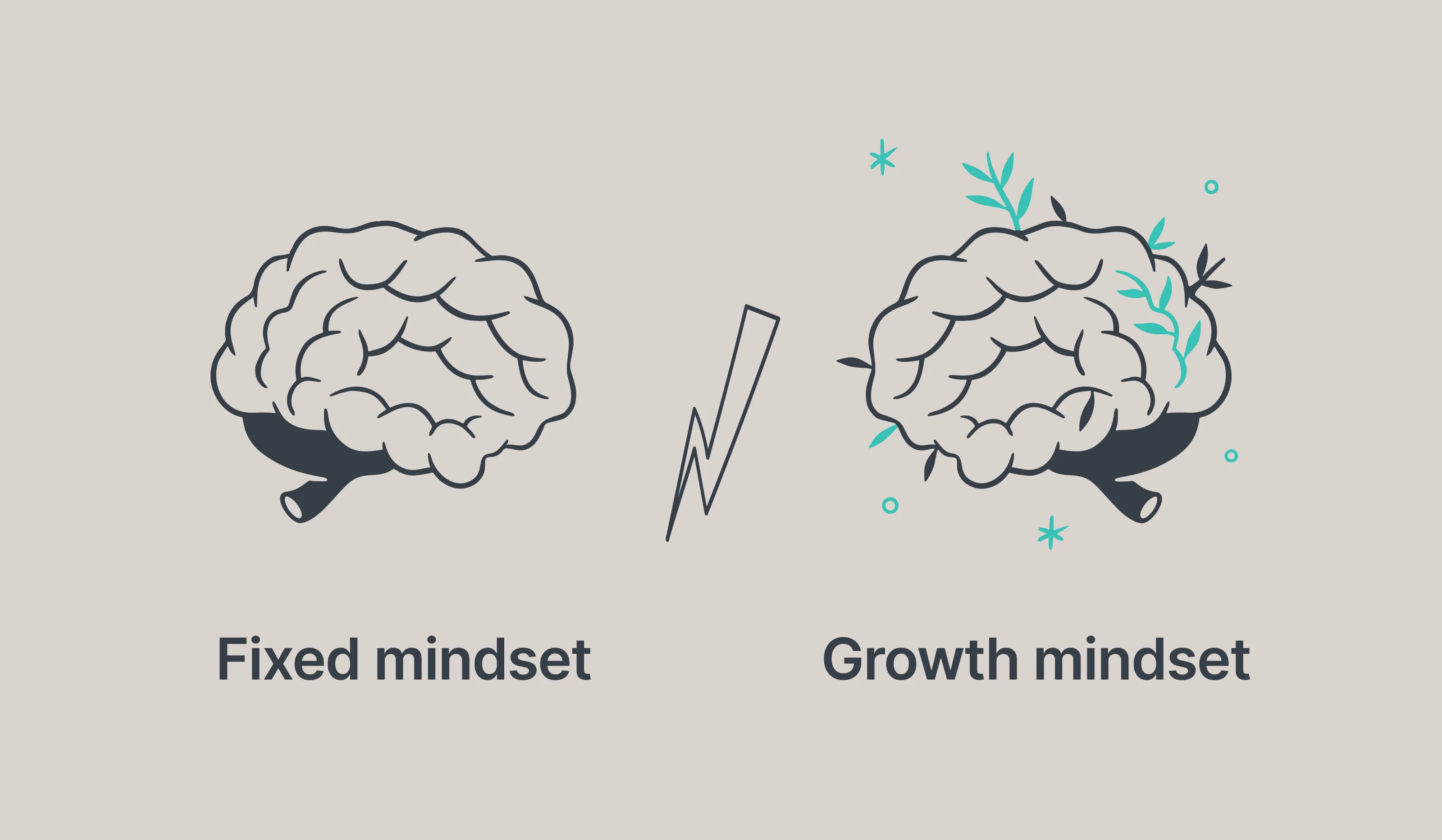


Cultivating the Growth Mindset: the key to success in software engineering
In 2023, Nexapp participated in the Agile Tour Québec, presenting a conference on "Developer Experience for Continuous Delivery". This conference, given by our VP of Engineering, motivated several members of the Nexapp team to be part of the audience at the Montreal edition, which brought together agility enthusiasts around the theme of "People at the heart of agility".
Among the highlights was Éliane Gilbert's talk entitled "The Growth Mindset to boost your career", inspired by Carol Dweck's book Mindset, which particularly inspired and captured the attention of many of us. That's why we'd like to offer you the opportunity to discover this concept, first by identifying the differences between Fixed Mindset and Growth Mindset, then by sharing the best practices for cultivating your Growth Mindset and, finally, by showing you how we apply them ourselves in the context of software development.
Fixed and Growth Mindset
The Fixed Mindset is the perception that our qualities are fixed and limit our potential. We avoid challenges, get discouraged more quickly in the face of difficulties and see failure as a personal limit. Nevertheless, the Fixed Mindset is okay. It can provide the comfort and security you desire or need in specific contexts.
The Growth Mindset embraces the idea that we can develop our skills and intelligence through effort and perseverance. Cultivating a Growth Mindset enables us to persist despite obstacles, to see failure as an opportunity to learn, and to value the continuous learning process. Adopting a Growth Mindset enables us to overcome our limiting inner voice and realize our full potential through daring and constant improvement. This mindset is not necessarily innate; you can foster it over time.
It's important to note that both mindsets can coexist. Constantly adopting a Growth Mindset would be unsustainable, as it requires a lot of energy. The challenge is to learn when and with whom to adopt the right mindset, depending on the context or situation. For example, in some cases, adopting a Fixed Mindset is a good idea when you don't feel ready or are already in a complex situation.

Developing your Growth Mindset
Here are a few ways in which you can build your Growth Mindset.
As a software developer
- Dare to take on a challenge
Dare to take on more complex tasks involving the unknown and persevere with them. Challenges are opportunities to learn and strengthen your skills and resilience. - Celebrate effort, not just success
Some of our solutions don't always pan out in our daily work. These trials are not failures but opportunities to learn and innovate. Recognizing how far we've come and what we've learned is essential to keep improving. - Experiment
Try out new technologies, work methodologies, and design patterns. Don't be afraid to make mistakes; they're opportunities to learn. - Remain open to constructive criticism
Ask your peers for feedback. This will help you gain new perspectives and improve. - Team up with your peers
Share your knowledge and learn from others to foster collective learning and inspire growth and collaboration in your team. - Foster continuous learning
Stay curious and keep up to date with the latest developments in the field.

As a Team Lead
- Embrace the Growth Mindset
As a Team Lead, set an example by promoting autonomy and personally integrating the Growth Mindset into your day-to-day management. - Create a learning culture
A continuous learning culture underpinning the Growth Mindset strengthens team member commitment. Get team members out of their comfort zones to foster personal and collective growth. - Foster a sense of perseverance within the team
Promote proactive responsibility to foster team cohesion and perseverance in facing challenges.

As a mentor
- Promote two-way discussion
Learning is enhanced when the discussion is two-way between a senior developer and a junior developer. These exchanges allow both parties to share their ideas, leading to mutual understanding and more effective problem-solving. - Support continuous learning
Motivate your mentees to remain curious, train regularly, stay current in their field, and continue to develop. - Practice empathy and active listening
Take time to understand your mentees' needs and challenges by practicing active listening and empathizing with their realities. - Foster exploration and innovation
Welcome exploring new ideas and innovation, even if they fall outside your usual comfort zone. - Embody resilience
Show by example how to overcome obstacles and failures, using them as learning opportunities.

Discovering the Growth Mindset
Here are a few testimonials highlighting the key moments when the Growth Mindset emerged in the lives of a few of Nexapp's development team members.
The reality of start-ups
When I started working at Nexapp, the company was still just a service start-up. We were four programmers managing several projects in parallel. We had to program, define standards, manage customers, track budgets and, sometimes, even design. Most of these points were unheard of with my university background in computer science. This situation forces us to develop a growth mindset to do our jobs well and provide good customer service.
Today, our teams include programmers, designers, Product Owners, and account managers. Despite these different roles within the same team, we continue to focus on teaching the whole company these different responsibilities to work better as a team and deliver good products.

From student to professional
Throughout my studies, I placed great importance on my academic success. The last thing I wanted was to fail assignments, exams and classes. I put much pressure on myself and left little room for error or experimentation. It was hit or miss.
When I started working for Nexapp as a software developer, I faced new challenges and quickly realized that my fear of error or failure limited me. With time and experience, my perception gradually evolved. I began to understand that mistakes are not an end in themselves but an opportunity to learn and grow. I realized that the learning process and the knowledge gained from resolving a bug are more important than the resolution itself.
Rather than focusing solely on success or failure, I valued effort and learning more. Every challenge became a source of improvement, every effort a victory. I discovered that this growth-oriented perception is called the Growth Mindset. This change of perspective has enabled me to approach my goals proactively and positively.
This evolution has enabled me to transform the pressure to perform into motivation to learn and progress. This has enhanced my career as a software developer and influenced my perception of challenges and failures in all aspects of my life.

Growth Mindset late in life: it's possible
"- But I won't be able to do this systems audit; I don't speak English!
- I've been trusting you for three years and will keep doing it!"
In three weeks, English-speaking auditors will audit the entire software platform for which I'm responsible, and my supervisor insists that I must be their point of contact.
"I can't do it. I just can't. It'll never work. I won't change this at 25!"
It took three weeks to transfer information and learn how to communicate. I didn't know it yet, but in three weeks, I would take a giant step out of my comfort zone—my first dive into the Growth Mindset without realizing it.
Against all expectations, the audit went well. With my stammering English and a lot of preparation, the auditors left satisfied. And that was just the beginning! Aware of the new opportunities for growth and learning that were opening up for me, here I was a few months later, still driven by the confidence of my supervisor, in San Diego, then Dallas, Jakarta and Manila.
I realized later that my English-speaking alter ego induces a more flexible state of mind, capable of plunging into uncertainty and the unknown, confident that it will come out on top. There's a gap between my daring "English thinking" and my more reserved French version, accepting the status quo as a victory. Little by little, I'm realizing that I can transpose these new mechanics. I can learn from myself.
It took me many years, and it's still a work in progress, but it's surprisingly possible.
While the influence of parents and school certainly plays a vital role in developing a Growth Mindset, they are fortunately not the only key factors. The environment and the people who support us at the right time can be just as crucial. With perseverance, it's possible to change your mindset at any age without getting lost along the way!
As an anecdote, when I was in San Diego, one of the directors jokingly asked me in English: "Do you have any family in America? That might make things easier..."
"No... Not yet!"
I recommend this article if you'd like to learn more about the behavioural changes associated with spoken languages.

From developer to coach
At the start of my career in IT, my focus was mainly on developing my technical skills. Like many, I wanted to gain experience to meet increasingly complex needs. Over the years, I developed expertise in various aspects of software development.
Over time, several career paths open up naturally. For example, a developer may gradually move into management to become a Team Lead or Engineering Manager. Some continue to hone their technical skills and even go so far as to become Tech Leads. Initially, this was the route I planned to take. However, a third path presented itself before me: that of the coach. I will use the knowledge I've acquired throughout my career to help my colleagues, the next generation, and the community develop and nurture their growth mindset and the tools of tomorrow.
It's a path I'd never even considered. Will I build my career on it? I couldn't say. Do I have imposter syndrome, which has been with me since I started this adventure? Always! I don't have the absolute answer to every question. That doesn't invalidate everything I've learned in my career, and many people would benefit from that learning.

Comme on peut le lire à travers les différentes interventions, l’adoption d’un Growth Mindset est essentielle : elle ouvre la porte à une amélioration continue des compétences tout en accueillant le changement et cela à tout moment de la vie. Cette mentalité permet d’appréhender les défis complexes et les retours constructifs comme des tremplins vers la prochaine avancée professionnelle et personnelle.
In conclusion
In conclusion, promoting a Growth Mindset through leadership at Nexapp creates a synergy where every team member feels supported and ready to excel and innovate. Team Leads play a role in this dynamic, balancing support and autonomy, enabling coaches and mentors to flourish in their mission to accompany developers ready to grow at 150%!
Nexapp's continuous learning and evolution culture is an essential driver for remaining competitive in a constantly evolving field. With this mindset, every challenge becomes an opportunity, every failure a lesson, and every success a step toward new heights. By fostering this philosophy, Nexapp ensures its present success and paves the way for a future filled with remarkable innovation and achievement.
Philippe Geluck's "Le Chat" could sum up the idea of the Growth Mindset

From the album "La Rumba du Chat" by Philippe Geluck
If you don't know where you're going
Go anyway
And once you're there
You can ask where you are
Et si votre projet était subventionné?
Vous pourriez financer jusqu'à 50% de votre projet d'intelligence artificielle grâce aux programmes de subventions.


Continue reading
Predictability: 10 Years of Evolution in Agile Estimation

